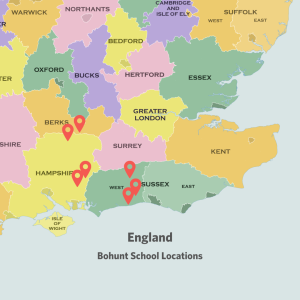Community Field Placement: Bohunt Education Trust
Overview
| Location | United Kingdom (multiple locations) |
| Arrival Date | April 27, 2025 |
| Teaching Dates | April 28 – May 16, 2025 |
| 5 Credits | EDUC 442 (Community Field Experience) |
| Eligibility | Enrolled in Bachelor’s of Education, preference given to TAs |
| Approximate Program Fee | $3,100-$3,500 |
Application for this program is now closed
Program Information
About the program
The Bohunt Education Trust Community Field Placement is an International placement that will allow candidates to work with small groups of students in secondary school in and out of the classroom.
Check out the Bohunt brochure to learn more about this organization.
ELIGIBILITY AND PREREQUISITES
This course is designed for:
- Students enrolled in the Bachelor of Education program (specifically the Community Field Experience)
- Preference will be given to TA’s as none of the schools are elementary schools
COURSEWORK
EDUC 442 – COMMUNITY FIELD EXPERIENCE
A combined course and field experience designed to introduce students to the importance ‘place’ in the field of education. Emphasis is placed on the challenges and opportunities of living, working and teaching overseas, as well as the extent to which cultural understanding can enrichen that experience. The field trips in particular will highlight the intersections between culture and education in a variety of work settings.
locations
You will be placed in one of many schools throughout the south of the UK.

Timeline
Arrival: April 27, 2025
In-Country Dates: April 28 – May 16, 2025
Program Fees
Program fees: $3,100-$3,500. The final program fee depends on the number of students in the program.
| Included in program fee | Not included in program fee |
|
|
AWARD
Every student accepted into this program will receive a $1,000 Global Seminar Award. This will be distributed to students in May 2025.
Program Director Bio
 Karen Switzer, BEd, MEd
Karen Switzer, BEd, MEd
I have many roles within the Okanagan School of Education from lecturer/adjunct professor to field advisor. I am excited to be the faculty supervisor for the UK experience with Bohunt Trust as I grew up in the UK and lived in the south of England for many years. I’m hoping to learn more about how the UK education system is evolving and keeping up with current trends in pedagogy.
Karen has been an educator for more than 30 years – teaching at all grade levels including primary, intermediate, middle, secondary and post-secondary. She has been an adjunct professor at UBC Okanagan since 2011 teaching in the Post Bac Program, Summer Institute in Education and in the Master’s Program. In 2017, she joined the BEd program as a faculty advisor.
She received her Master of Education degree in 2011 from UBCO. Her Master’s research focused on quality instructional and assessment practices in literacy and effective professional development for teachers.
Before joining the Okanagan School of Education, Karen worked in administration as the vice-principal at Kelowna Secondary School, and principal at Ecole Peter Greer Elementary School in Lake Country.
